Redditors Tell Off A Father Who Plans Pretending He Sold His Teen Son's Dog Because He Isn't Caring For It Enough
When you think of teenagers, what comes to mind? Reckless behavior?
Impulsive decisions? Late nights out?
For the most part, these stereotypes hold true. And that's why teenagers often aren't considered responsible enough to care for a dog.
After all, between school, extracurricular activities, and work, there's not much time left for taking care of a pet. Plus, many teens are still learning how to take care of themselves, let alone another living being.
A few signs that a teen may not be ready for the commitment required to care for a dog include a lack of dedication to hobbies or studies, disinterest in leadership roles or helping others, and an overall resistance to authority. Managing a pet requires much discipline and dedication—qualities that many teens simply do not possess yet.
Therefore, when considering whether to trust your child with caring for a furry friend, you must weigh their maturity level and consider all factors before making your decision.
A man who gifted his son a dog some years ago is realizing that his young man isn't responsible enough to care for a dog. And you know what his plan is to teach his son a lesson?
He wants to pretend that he sold the dog. But before doing so, he consulted the “Am I The A**hole?” (AITA) community first.
His idea wasn't received well. On top of that, he was criticized for two things.
The original poster is a father who got a dog for his younger son as a gift.

The dog is starting to show behavior problems.
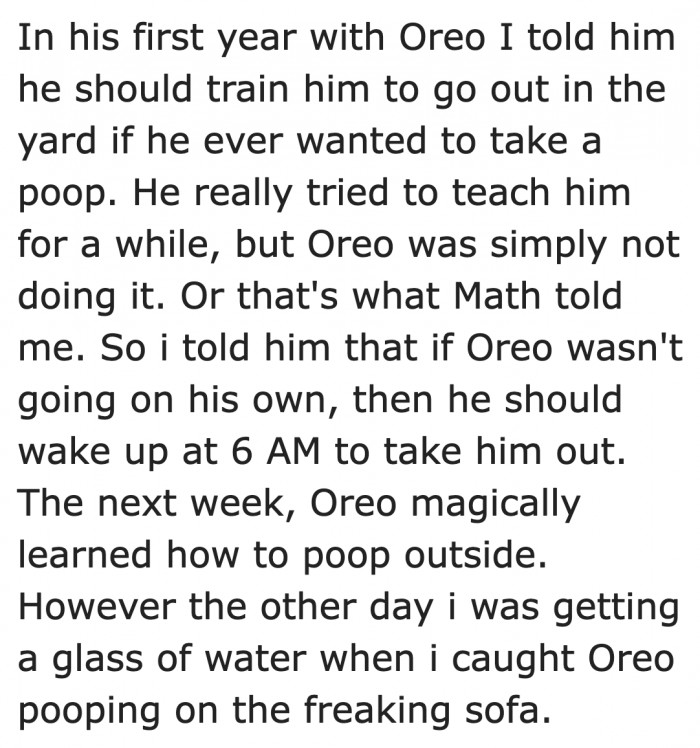
The dog started destroying things at home.
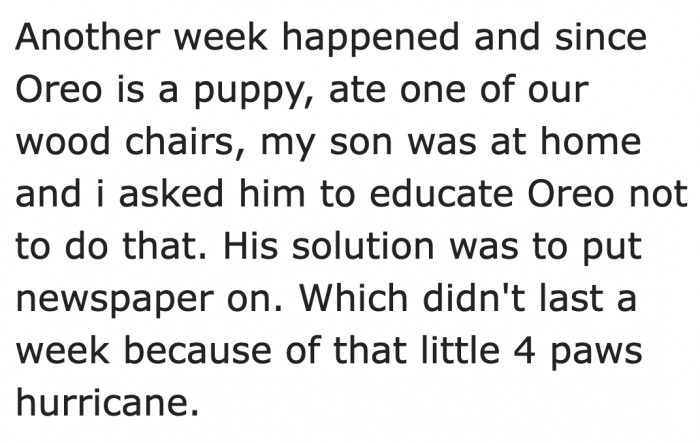
The Burden of Responsibility
According to developmental psychology, adolescents often struggle with balancing personal and familial responsibilities. Research from the University of Michigan highlights that teens typically prioritize social activities and academic commitments over caregiving tasks, leading to stress and conflict with parents.
This creates a significant burden, especially when parents expect full ownership of tasks like dog care. Parents should recognize this and ensure that responsibilities are age-appropriate and manageable, fostering a supportive environment.
Parental Responsibility and Child Development
Dr. Lisa Harper, a child development expert, emphasizes the importance of parental involvement in teaching responsibility to children.
This situation reveals a common challenge where parents struggle to balance expectations and support for their children's growth.
Research in developmental psychology suggests that gradual exposure to responsibilities can enhance a child's competence and confidence.
It is also making a mess of their home.
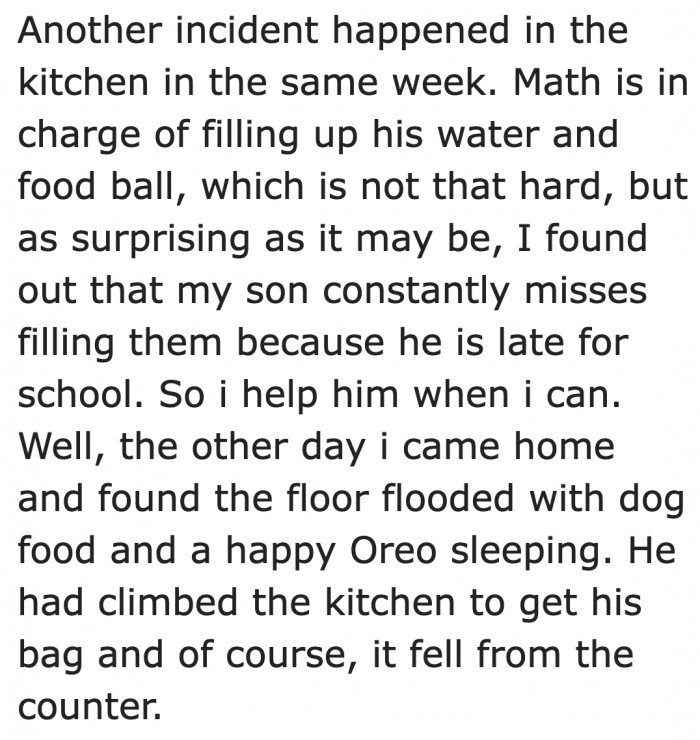
The poor dog stinks. It isn't properly cared for.
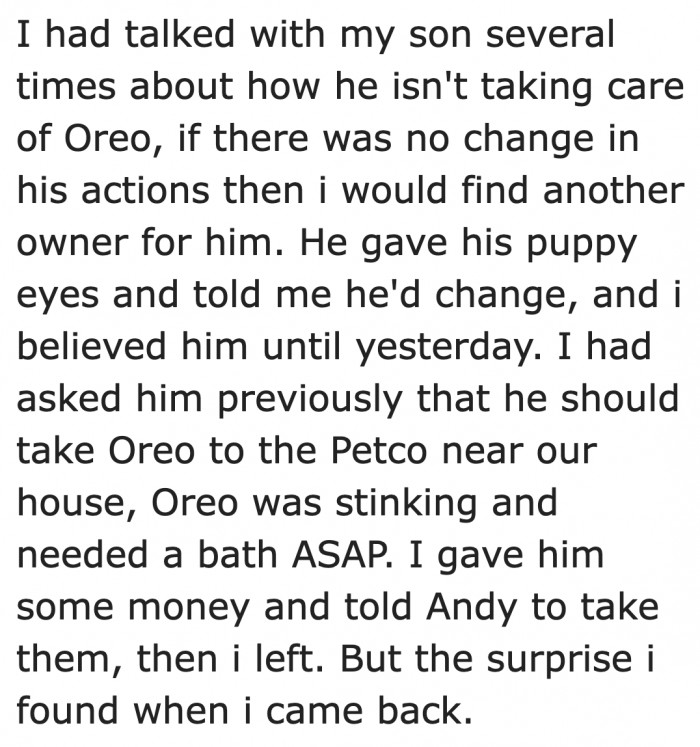
His son decided that playing video games is more important than caring for the dog.
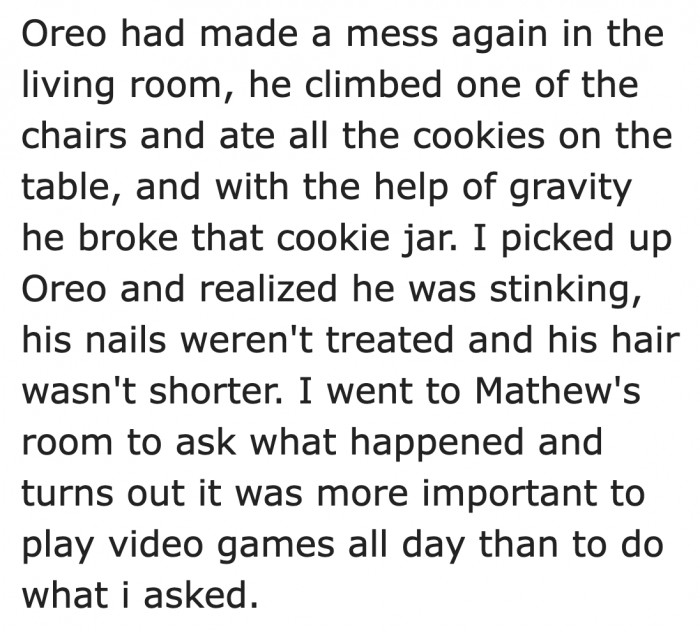
Dr. Linda Wilkins, a developmental psychologist, emphasizes that realistic expectations are crucial when assigning responsibilities to teenagers. She notes that teens may experience anxiety when faced with overwhelming tasks, which can lead to disengagement.
Research indicates that teens are more likely to engage in responsibilities if they feel competent and supported. Thus, parents should provide guidance and encouragement rather than imposing strict demands, thereby fostering a sense of agency and accountability.
This scenario highlights the psychological concept of learned helplessness, where children may feel incapable of managing tasks due to a lack of support or guidance.
Studies indicate that when children are not given opportunities to engage in responsibility, they may develop anxiety and avoidant behaviors regarding tasks.
He states his plan and wants Redditors to judge it.
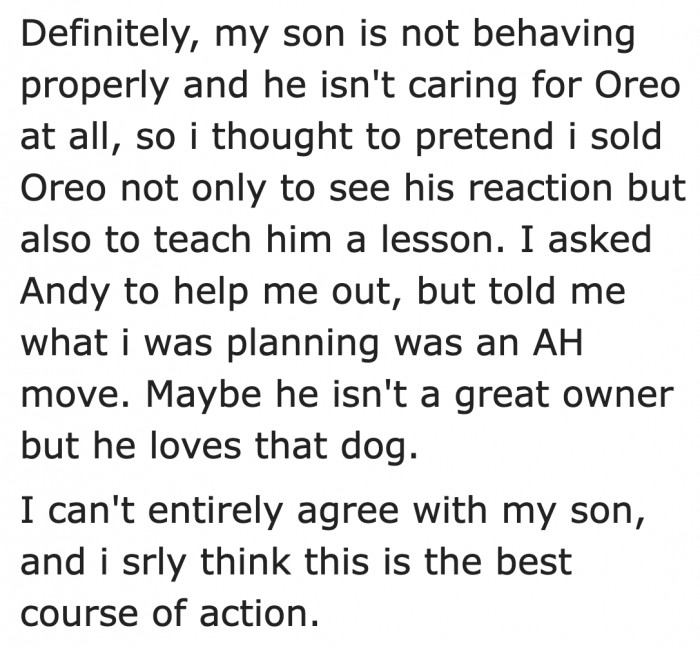
He is so wrong in thinking that his son can handle everything at 10 years old, which is the son's age when he received the dog.
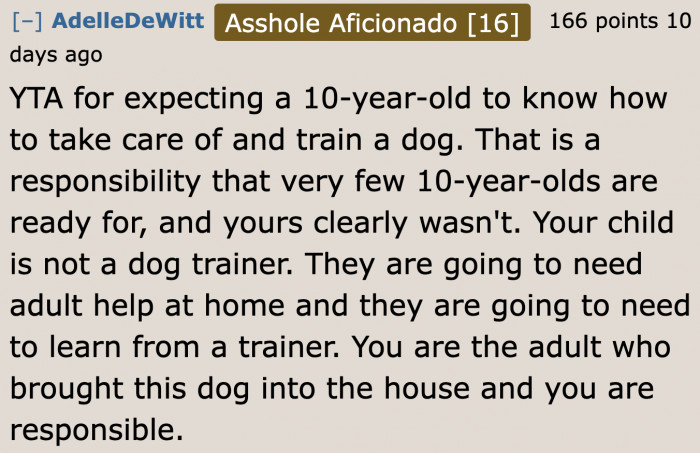
What the OP plans to do will make his son distrust him.
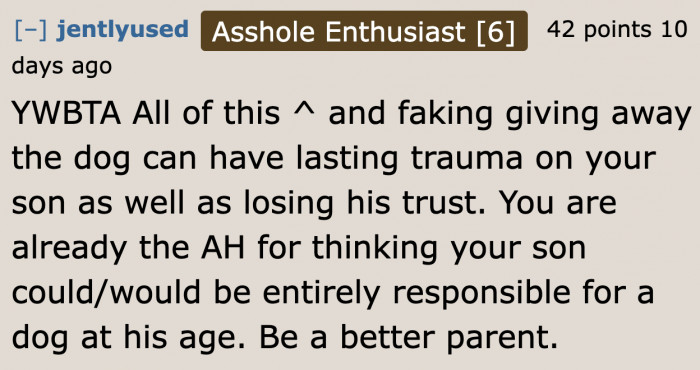
The Role of Communication
Effective communication is pivotal in family dynamics, especially during adolescence. Research from Harvard Medical School shows that open dialogues between parents and teens can decrease misunderstandings and foster cooperation.
Parents should initiate conversations that clarify expectations regarding pet care, allowing teens to express their concerns and preferences. This collaborative approach not only builds trust but also empowers adolescents, making them more likely to take ownership of their responsibilities.
Effective Strategies for Teaching Responsibility
Experts recommend that parents implement gradual responsibility training, allowing children to take on age-appropriate tasks.
This could involve breaking down larger responsibilities into smaller, manageable steps, fostering a sense of accomplishment.
Research shows that this incremental approach helps build resilience and a sense of agency in children.
A Redditor believes that now that his son is a teenager, he should be able to care for it properly.

It's the responsibility of the dad to set an example for his son. The OP obviously failed at this.
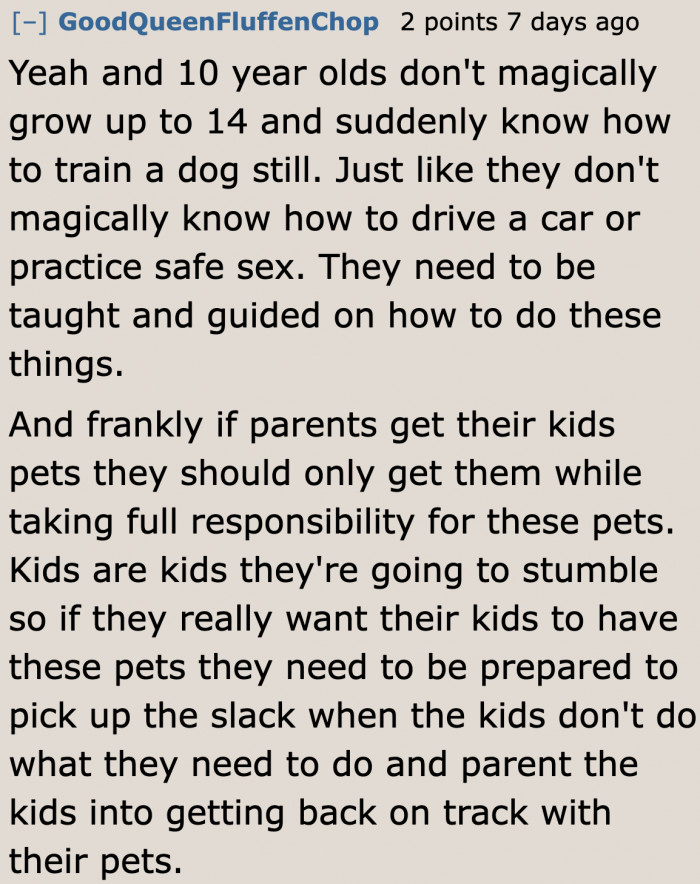
Adults should always be involved in caring for a dog. They can't just leave it up to their children.
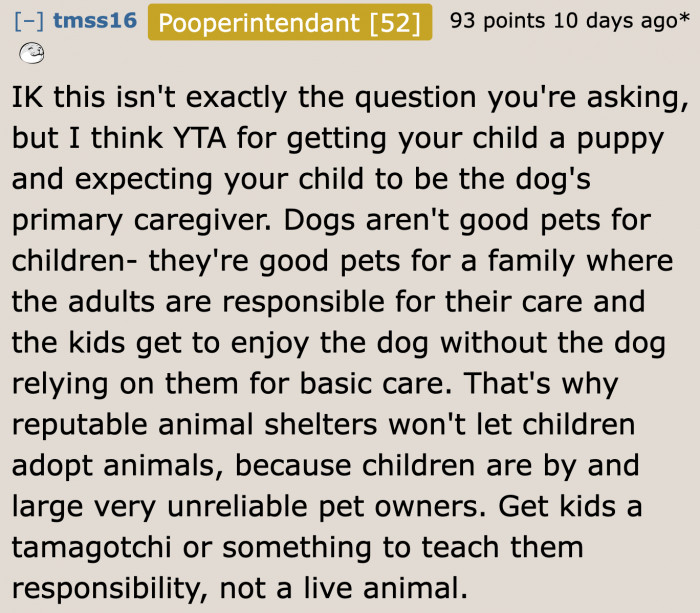
Behavioral psychology suggests that reinforcement plays a key role in shaping responsible behavior in adolescents. Positive reinforcement, such as praise or small rewards for completing tasks, can motivate teens to commit to caring for a pet.
Research shows that this method encourages the development of intrinsic motivation, which is crucial for sustaining long-term responsibility. Parents should consider integrating a reward system that acknowledges their teen's efforts in pet care to enhance engagement.
Family therapists also suggest that regular discussions about responsibilities can create a shared understanding of expectations.
Using positive reinforcement to acknowledge efforts can further motivate children to engage with their responsibilities.
Ultimately, fostering a supportive environment is key to developing responsible and capable individuals.
There are better ways to discipline the OP's son. He shouldn't be using the dog for this purpose.
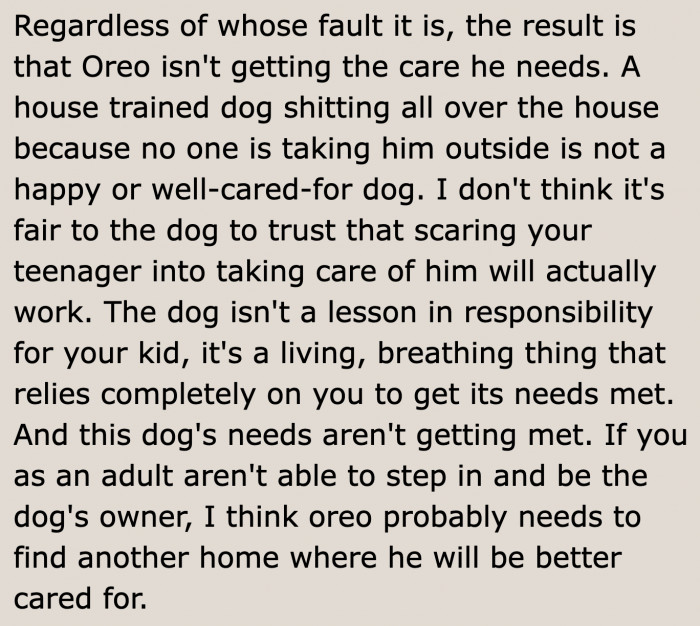
For Redditors, his plan is simply a bad idea.

Getting a dog takes great consideration.
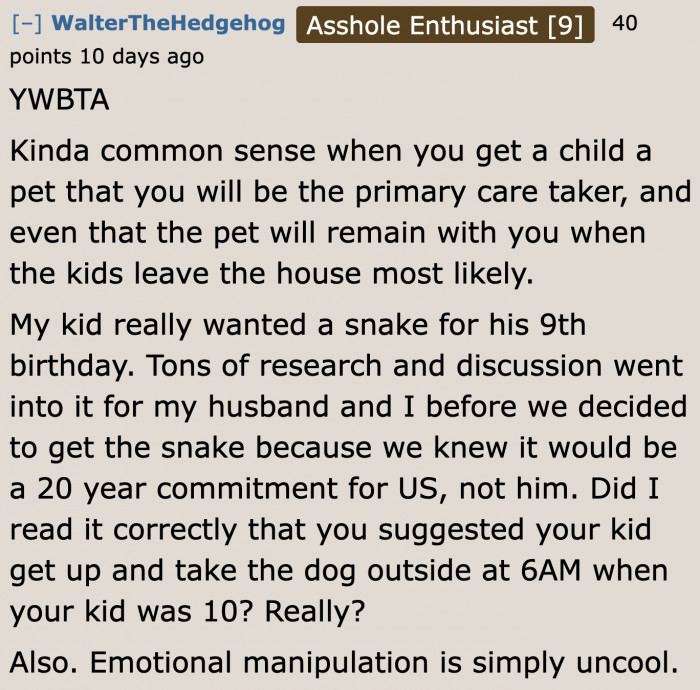
Understanding Teen Development
Understanding the stages of adolescent development is essential for setting appropriate responsibilities. According to developmental theories, such as Erik Erikson's stages, teenagers are navigating identity formation.
This can lead to a focus on self rather than external responsibilities. Acknowledging this developmental phase can help parents adjust expectations and provide support, facilitating a smoother transition into mature responsibilities over time.
Getting a dog for children = It's largely the parent's responsibility.
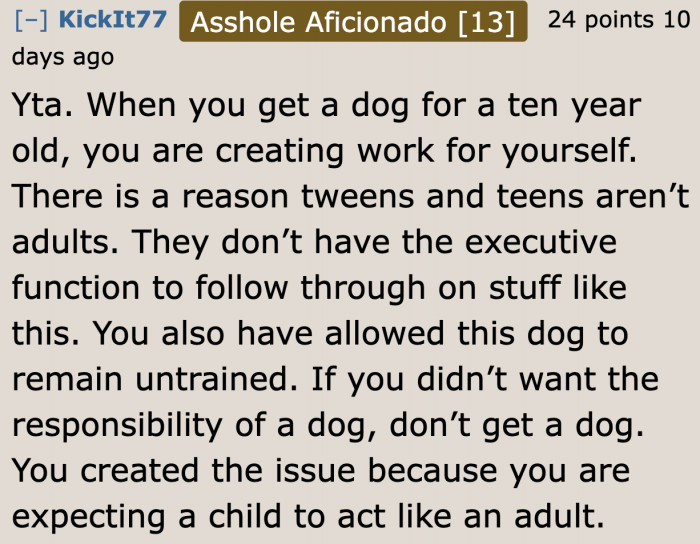
His plan will only traumatize his son for life.

In reality, it's all the OP's fault for depending on a 10-year-old to care for a dog.
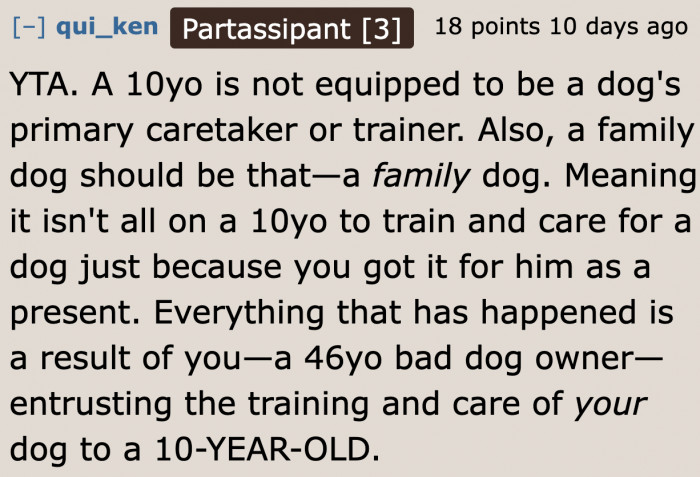
Research in family systems theory indicates that parental expectations can significantly impact adolescent behavior. A study by the American Psychological Association found that unrealistic demands can lead to rebellion or withdrawal in teens.
Instead of threatening drastic measures, like pretending to sell the dog, parents can engage in discussions that highlight the importance of shared responsibility, emphasizing teamwork in caring for family pets.
He's a bad parent and a bad dog owner at the same time.
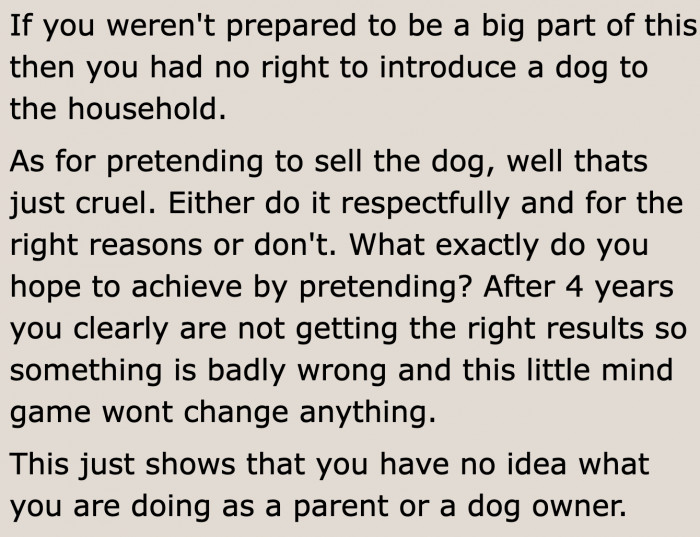
Dogs are like babies. That's why adults should always be involved in caring for them.
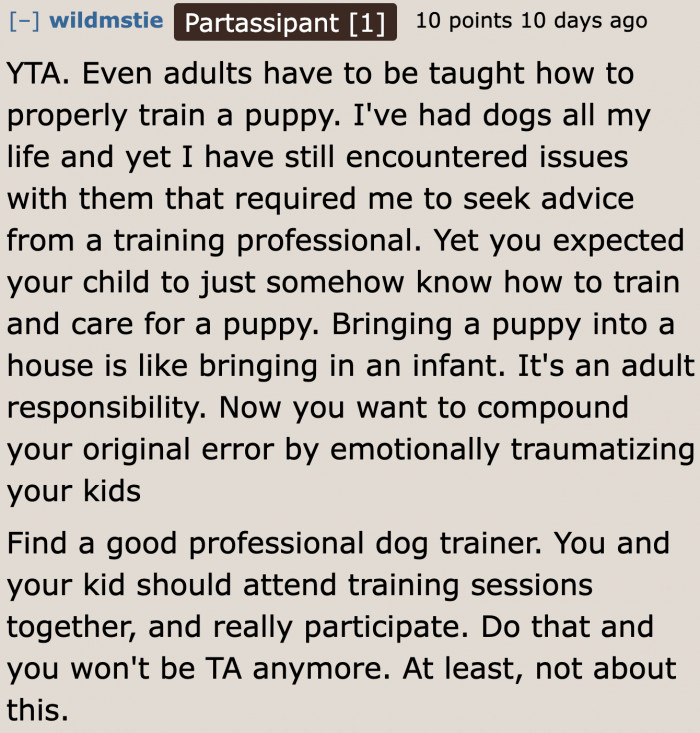
It's the parent who teaches the children how to be a proper pet owner.
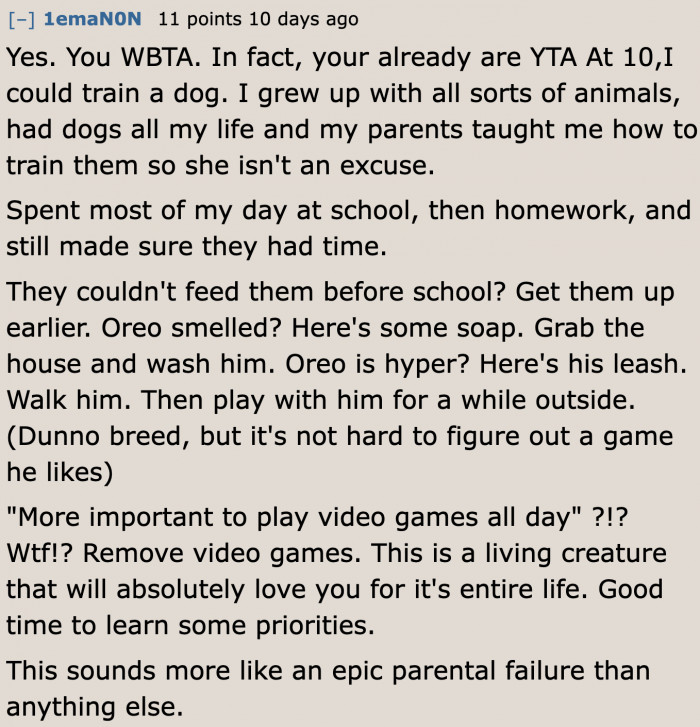
The Impact of Stress
Chronic stress can impair a teenager's ability to manage additional responsibilities effectively. Studies show that high-stress levels, often resulting from academic and social pressures, can reduce cognitive functioning and emotional regulation.
Parents must be aware of their teen's stress levels and consider adjusting expectations accordingly. Providing emotional support and understanding can help alleviate pressure and promote a healthier balance between personal commitments and caregiving duties.
What the OP did is like gifting an infant to a child.
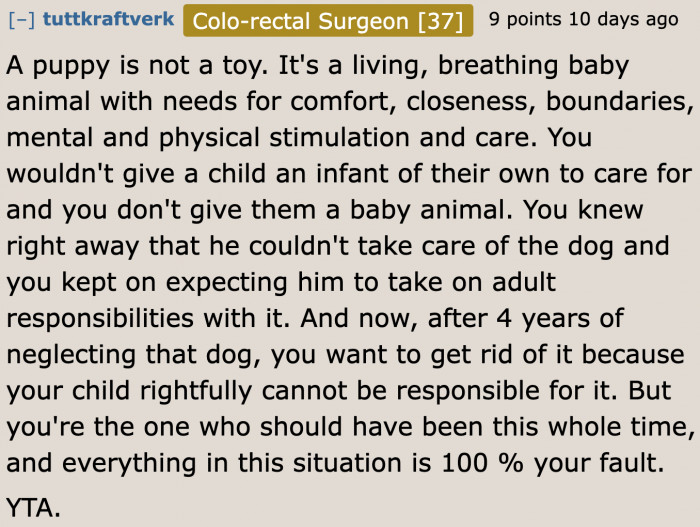
Once the parents decide to take a dog, it's the responsibility of the entire family. But most of that responsibility falls on the parents.
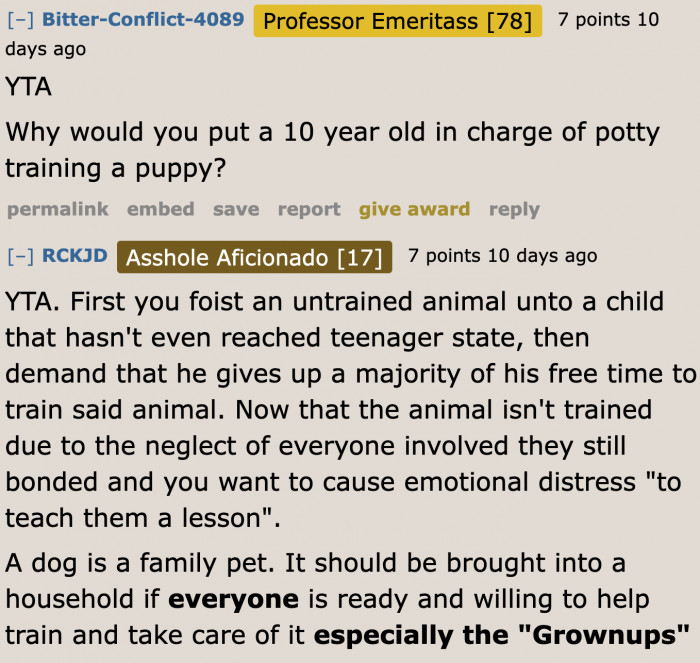
Children aren't old enough to be responsible for a dog.
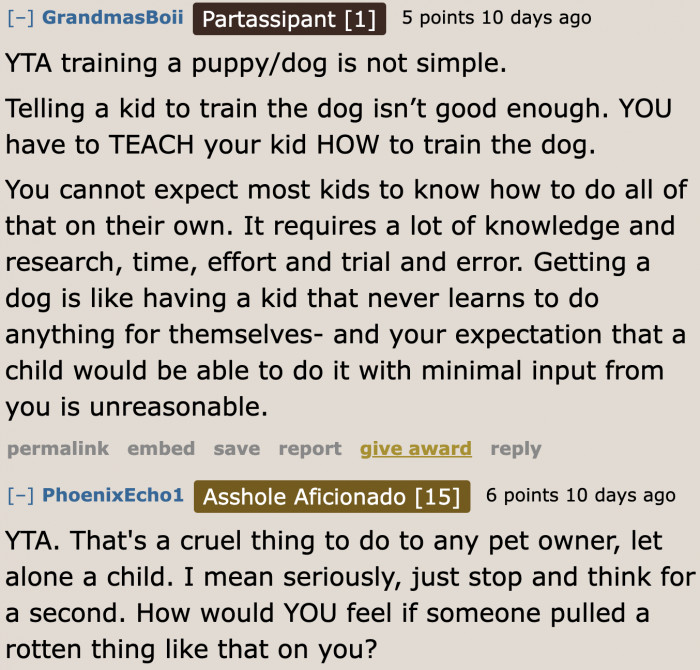
According to research published in the Journal of Adolescent Research, peer influence plays a significant role in shaping a teenager's behavior and responsibilities. Teens often prioritize peer validation over familial expectations, which can complicate their ability to care for a pet.
Parents should encourage positive peer interactions that emphasize responsibility, possibly by involving friends in pet care. This not only fosters social connections but also integrates responsibility into their social activities.
If you don't know how to care for a dog, then there's no way your child would know it.
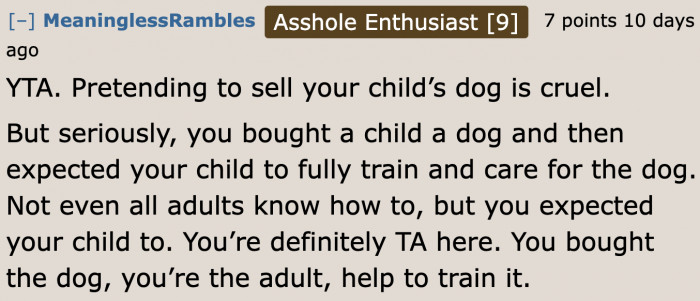
The OP only realized the problem after four years.
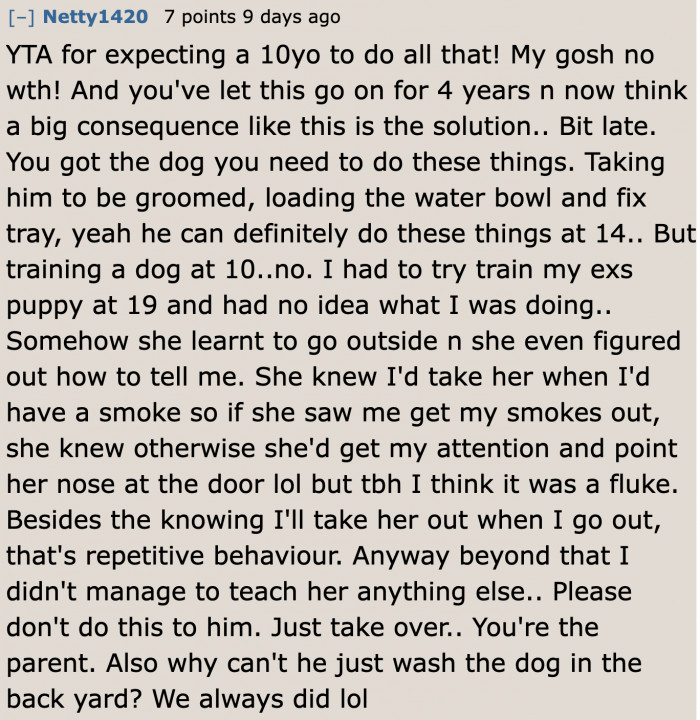
His plan will mar his relationship with his son.
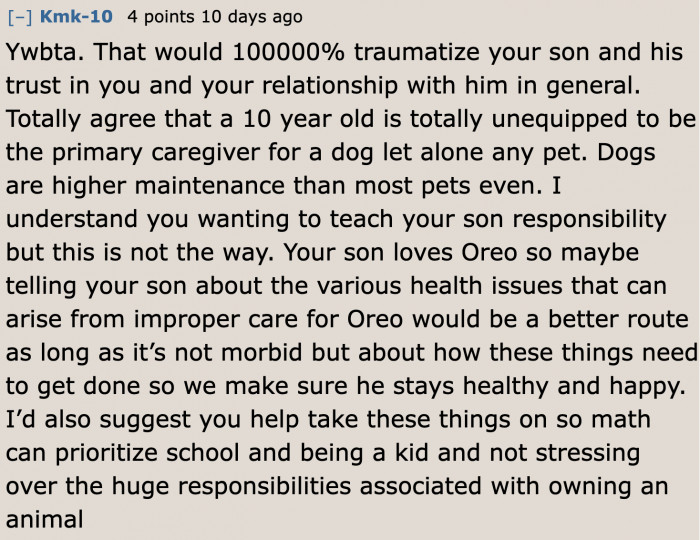
Setting Realistic Goals
Setting realistic, incremental goals for pet care can significantly enhance a teenager's engagement. Behavioral psychologists advocate for the SMART criteria—Specific, Measurable, Achievable, Relevant, and Time-bound goals—as an effective framework.
Parents can work with their teens to establish small, manageable tasks related to pet care, which can build confidence and a sense of accomplishment over time. This approach encourages responsibility without overwhelming the adolescent.
A user finds the OP's plight laughable.

Does the OP not realize that a dog is also a family member?

Good pet ownership in the family starts from the efforts of parents.
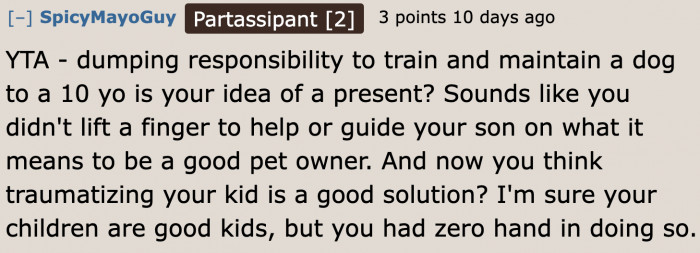
Research underscores the importance of empathy in family relationships, particularly during adolescence. A study from the University of Pennsylvania highlights that empathetic parenting fosters resilience and responsibility in teens.
When parents listen to and validate their teen's feelings about caring for a pet, they create a supportive environment. This promotes emotional growth and helps the adolescent develop a sense of duty towards their responsibilities.
It's time for the OP to rethink his parenting ways.
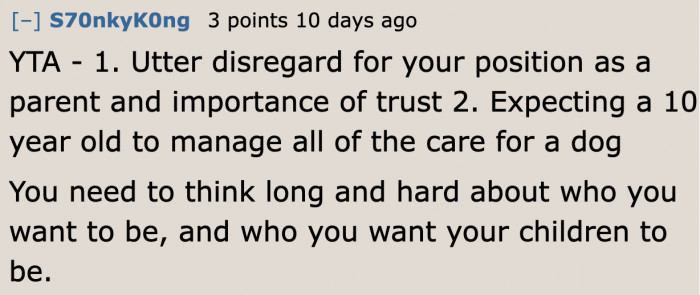
Teenagers aren't irresponsible by any means. When you look at the OP's post, you can see that the young man is doing great in his studies.
But when it comes to taking on the responsibility of caring for a pet? It may be a little too much for him at this stage in life.
Responsible pet care requires advanced skill sets and foresight beyond most teenagers' current capabilities. That's why it should be the adults who start being good dog owners before they expect their children to be one as well.
Psychological Analysis
Our in-house psychologist notes that this situation reflects common challenges in parenting, particularly regarding teaching responsibility.
Recognizing the balance between expectation and support can lead to more effective parenting strategies and healthier child development.
Analysis generated by AI
Analysis & Alternative Approaches
This father-son dynamic reveals the complexities of teaching responsibility within family relationships.
Experts emphasize that fostering independence through gradual exposure to responsibilities is paramount for healthy child development.
By implementing effective strategies, parents can guide their children in becoming responsible and confident individuals.
Therapeutic Insights & Recovery
In summary, the intersection of adolescent development and parental expectations can create complex challenges in family dynamics. By applying principles from developmental psychology, effective communication, and behavioral reinforcement, parents can foster a supportive environment that encourages responsibility without overwhelming their teens.
Ultimately, understanding the developmental context and adjusting expectations to align with their teen’s capabilities can lead to healthier family relationships and more engaged pet care. By working together, families can nurture both their adolescents and their pets.



